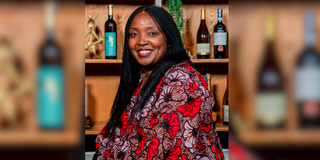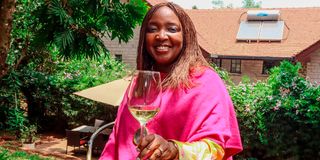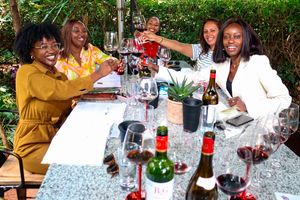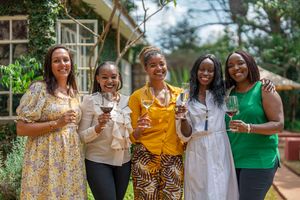
Victoria Mulu-Munywoki, a sommelier and founder CELLAR254, an online shop in Nairobi.
Victoria Mulu-Munywoki loves a good drink. She loves the way it sits on the roof of her tongue. She loves it when her taste buds seem as if they are fighting with the flavour. Victoria knows much about drinks in general, and wine in particular. With more than a decade’s experience in the wine trade and the first Kenyan sommelier, she is the founder of the online store CELLAR254 and Captain of Team Wine Kenya.
At the Social House in Nairobi's Lavington, the mother, the wife, the nomad—talks about serendipity, what others call luck, what others might call fate—that set her on her professional path, “being at the right place, at the right time.”
“But I am grateful for my husband, he is my support system,” she says.
Wine has been her liquid asset. In 2023, data provided by Wine Owners, ranked wine second to whisky in the Knight Frank grouping with average 146 percent growth over the 10 years.
How did you get into this?
Serendipity, being at the right place at the right time. This was about 20 years ago. I was at lunch with my boss at the time in Germany and he ordered the entire meal including a glass of wine—my first ever. A Riesling. It was very crisp and tasted different, felt different. I had never tasted wine before nor knew how to hold a glass. I was curious and decided to learn more about wine. My plan then was only to fit in corporate lunches and dinner. Fast forward, I pivoted from what I was doing for family reasons and decided to go into the wild world of wine.
The official tag is wine consultant—but how do you describe what you do?
I am a catalyst and evangelist—I connect people, and create a community; my mission is to make sure the wine culture takes root in Kenya and advances in an organised way, I educate and encourage people to drink wine, but drink responsibly. Wine should not be associated with debauchery and unsavoury behaviour, the discipline and etiquette of consuming and enjoying wine are key in growing the industry.
What was your fork on the road moment that got you, and maintained you, on the wine path?
I was looking for a challenge, something that would pique my interest in the long term—something I could enjoy doing in my old age. Wine has had me excited for many years, always learning something new, meeting new people. I found out that there is always a new wine or producer to discover, changing laws around wine, there is so much to learn you can never be truly an expert who knows everything about wine from every wine-producing country in the world. That was my Damascus moment.
Have you had any formal training on this?
My business acumen stems from an MBA from Strathmore and IESE Business Schools. But many years ago, I embarked on wine and spirits education. At that time, being a sommelier needed one to be conversant with all beverages and their service —wine, tea, coffee, water, spirits, sake et al. After studying for the WSET diploma and SAKE [Japanese wine] certification, I went to the Shaker Cocktail School in London for mixology training. My singular thought was rooted in, when I sit around the table with friends or strangers, I need to hold my own. I leaned into wine because the stories were endless and the people were quite interesting before the liquid itself stole my heart. Coffee would have been a great alternative...
What qualities make for a good wine consultant?
Tenacity, a voracious reader, you must be knowledgeable and passionate but you certainly must like people—this is a people business. You must appreciate, love, and understand the people around wine. To be a consultant, you must have a good business background—I worked in banking, advertising, and education and there are convergence points with what I do right now, say for instance wine investing, to marketing, selling a product, and positioning it. A good business background sets you apart from the pack. You also need a generosity of spirit—to share unequivocally with people and lift as you climb.
It's one thing to be passionate, it’s another to turn that passion into a paycheck. How did you do it?
I made better money in the banking world than I do now. You must identify the gap in the market then put in your blood, sweat, and tears, and after knocking on doors, over deliver on your promise. When I first started my business here, it was predominantly white, male and expatriate-centric. The value that you bring to the market is what grows the portfolio and therefore the bank balance.
What have you learned about yourself being in the industry and Kenyans’ wine consumption tastes?
Kenyans are discerning, they just need a bit of information and they run with it. They are receptive and experiential and give you feedback that propels you forward. Also, do not try and drink with Kenyans, they will leave under the table, haha! But they also know how to drink responsibly—there has to be food, not just crisps, but something dense like meat.

Victoria Mulu-Munywoki, a sommelier and founder CELLAR254, an online shop in Nairobi.
Lastly, they have deep pockets—literally. You have to work hard to get a cent from them, but when you do get their buy-in, they spend easily. I have learned that I am patient and I very much enjoy being around people, I don’t think I can do a back-office job, I love contact with different people. I am a giver.
Changing careers is a risky decision—what was the key decision you made that gave you the safety net to lunge in completely long term?
I started working at 17, and that discipline was key because I don’t know how to idle, my way of relaxing is doing something. The other good decision was to go work in Europe, which moulded my character and toughened me up—talk about going with the flow. It opened my eyes, teaching me what my university could never do. Travelling is the best teacher.
How have your different travel experiences poured into your career?
I was a sportsperson, and I represented Kenya in table tennis. That gave me a competitive side and I am constantly measuring and evaluating my progress and performance. I have lived and worked in half a dozen countries, which gives me a different lens and energy—it also heightened my empathy for people and situations, which perhaps makes me a good friend and intuitive on the business side of things because this is a hard business and a lot of my business partners may not always be necessarily doing as well or progressing as fast as they hoped.
In other words, I am versatile. My global experiences have encouraged me to be quite opinionated without fear of being judged. I try to use that quality to inspire others because anything left unsaid could have changed someone’s life. You have to be decisive but diplomatic, which I think makes for a good consultant.
From your wine experiences, what shifted the way you think about wine or the wine business?
I did a grape harvest and I can say I will never do another one again. We harvest at particular temperatures, especially early in the morning. Picking the grapes started at 2.30am, it was back-breaking work! Then the winemaking job in the cellar started at 6am when we had to press the grapes. I thought about this cycle, and I realised it was not for me. The process of making wine is delicate work and very tiring. I have a lot of admiration for people who produce wine, the real work is in the vineyard, the shamba. Totally not glamorous at all.
How does that change how you take your wine?
I am more thoughtful about wine I don’t like. It changes how I communicate about wine—that arduous activity is a stern reminder not to break someone’s spirit just because they didn’t produce what your palate likes.
What do you have that others don’t?
I am random, which is how someone described me—they can never predict what ideas I come up with and at what time. The French would describe it as je ne sais quoi and I describe it as kuna vile. I am also intuitive and there is a way I read energies; you could be saying something but I can sense what your energy wants. I am a thought leader with a finger on the pulse of both local and international markets, I craft things not done before and think ahead of the curve. Perhaps I am not too boring [chuckles].
Tell me a story from your childhood that is a good representation of your life now.
Tough question. I have never been asked that question. My mom always says that I always wanted to know where and when we were going. She thought I never liked staying indoors, that I always wanted to be on the move, my family then called me “passenger.” Then it would irk me, now not so much. I like being on the move, experimenting. I have ants in my pants, so to speak. That is what has informed my career, from the film industry to advertising to banking and now wine!
As a wine consultant and wine lover, what is the opportunity people are not paying attention to in the wine business?
There is too much emphasis on sweeter styles of wine because that’s where everybody starts, it is softer on the palate. But there is a lot of education and awareness that has moved wine lovers from that style. For instance, from Italy, Kenyan consumers were used to their entry-level simple wines, now they are seeking Brunello di Montalcino and Barolo. The salient opportunity is in well-made, balanced wine. There is an insatiable opportunity and consumer base looking for legendary wines too.
Then again, the disposable income has been increasing and the middle class wants better-made and less-volume wines, therefore any award-winning or reputable wines that are historically not available in this market, the time is nigh! First and Second growths from some of the best producers in Bordeaux cost a pretty penny, yet we have local consumers who seek them out and demand these wines. There is also an opportunity with under-represented markets like American wines which are historically expensive and hard to access, perhaps because there is no trade agreement in place.
Lastly, there are pockets for the rest of the world that are not well represented in Kenya but with a little bit of education and marketing, there are gems and value to be had from around the world, especially from Spain.
What should I look for in a wine as an investor?
The key is to remember what kind of a drinker you are. It pays to be an ethical drinker—think about where the wine comes from, who is making it, where and how they are making it, do they treat their people fairly? Ethical drinking is like ethical investing. Also, do a lot of research before you invest: is this wine going to increase in value—short term or long term? Is it a reputable producer? How long do I want to keep wine for and how much do I want to spend? Buy low and sell high to make a tidy sum. Inform yourself about cult wines and upcoming producers, vintages, and countries plus their regions like Tuscany, Burgundy, California, Rioja, Bordeaux, Piedmont, Douro, Stellenbosch, Barossa. But you also need to know what you like, just in case the markets fall then you can enjoy drinking your investment without guilt.

Victoria Mulu-Munywoki holds a glass of wine during practice for the blind wine competition at the Wine Shop Kenya in Nairobi on September 21, 2024.
As a consumer, focus on the tactile sensation on the palate when choosing wine. Everyone has a special and different palette akin to personality. Identify what you like and drink around that profile—white or red? Both? Dry styles or off-dry styles? Fruity, savoury or both, wines matured in oak or not. Know your wine and your world opens up, you can then specifically seek wines from cooler or warmer climate, different styles of the same grape, or grape profiles that are similar to fruits you like. The world then becomes your oyster. I encourage beginners to go for fruitier wines and graduate to bigger bolder complex styles. Experimenting with different types and styles allows one to broaden their wine repertoire.
What do Kenyans lean toward?
Red wine! They love Malbec and red blends. Catena Malbec is a favourite in this country. Catena produces one of the best Malbecs in Argentina and the owner, Laura Catena, taught in Nairobi at Starehe Boys, many alumni still remember her. South African Cape blends have always been a wine lover staple and Chenin Blanc is very much loved too. Chianti, Rioja, and Rhone wines are gaining popularity in Kenya.
What’s your client base like?
Varied. I have local and international clients with different needs. I also work closely with the Spanish, Italian, French, and American markets. Their local embassies are pivotal in growing the wine culture in this country and they have a mandate to promote wine businesses.
How are you remaining top of the trade in your industry?
Contact. You have to be in constant contact with your clients, the market, and know what’s happening around the world. I do a lot of research. I travel to wine regions and I am constantly learning. You can do your wine qualifications but you have to refresh that knowledge by keeping yourself updated. Consumers are the most important, you have to stay in touch by questioning their desires, what they like and don’t like, and keeping up with their changing tastes and pockets.
What do you think is bad advice that people should ignore in this industry, especially women?
Particularly for women, your brain will be your asset. Look after yourself, the hospitality industry is tough and your reputation is everything. One slip and you could be written off. Your integrity is your calling card and your biggest asset. The bad advice I hear is that if they are not paying you, leave them alone. Money is important but you can never make enough money.
Our business is about people and pleasure, you may never be paid enough for what you think you deserve. However, start somewhere and you will build enough social capital and reputation to be paid fairly. Don’t leave money on the table, humility will go a long way when you are starting off and want to stay in this business.
Earlier you mentioned travelling the world for work. How did that play out in your decision to have a family in a demanding career?
Family was one of the greatest considerations in becoming a wine consultant. I wanted to work around my family life, and this allows for that. I switch off and spend time with my family and travel for work sometimes with them. I am a nomad at heart, I want to discover new places, and this profession gives me the power to do that. I haven’t travelled enough yet actually. There are producers I want to meet in the south of France, Santiago in Chile, Salta in Argentina, and now they are producing wine in China, which is interesting.
Has your femininity been a weapon or weakness?
I take my authentic self everywhere and apply it to what I do. I don’t think about the feminine or masculine energy at all. I think being a woman has helped me in the business because there aren’t that many experienced female wine consultants in Africa. Definitely this is a male driven business in the world. There was a gap that I filled, and it has worked for me. I also Coach an all-female team, Team Wine Kenya, who compete internationally at the World Blind Tasting Competition.
The team is three years old, and that is the one opportunity where it feels good to be a woman in the business—you get more positive attention, recognition, practice opportunities, education and sponsorship. It does not necessarily put money in our pockets but it has propelled the professional reputation of female sommeliers in Africa.
Did motherhood inform certain aspects of your career which you focused more on more or less?
A hundred per cent. My mother was a very present woman, and still is. She was influential in my life and I never noticed how busy she was, even though she was in the medical field, working shifts in the hospital. I wanted to give that to my children and when I had my firstborn, I knew something had to change. A few years after my second born, I knew I had to be consciously present in their lives, which is when I pivoted. Without family, what are you doing—for who, and what? I hope they will say they had a present mom, she was random, but she was fun.
Your career is not the conventional one, and the hours you work, plus your intention to be a present mother, how important is having a supportive spouse?
If you are happily married that’s one reason to stay married. You marry for various reasons and I couldn’t ask for better support. He has been monumental in my success and I am grateful—it’s not just emotional, but physical presence. He comes to my wine events and gives invaluable advice. He drinks what I ask him to (laughs). He also reminds me when to take the foot off the pedal.
You seem to have made well-calculated moves in life. Can one have it all?
No, that’s not possible. What is all? We are always evolving, wanting different things and when you think you have achieved it, there is another goalpost. I don’t think one should have it all, because where will your gratitude come from? I want to be fallible and correct my mistakes. I want to keep my spirit fresh. I don’t want to have it all. That’s boring.
What’s Victoria’s insecurity?
I really don’t like poverty! I also don’t want to be too far up my dreams and forget there is a higher power that provides for this success. It is easy to forget God and that is my biggest fear. He has been faithful, and sometimes undeservedly so.
What is something difficult you go through that not many people get to see?
Being broke. I run out of money, don’t be fooled by rich aunty vibes [chuckles]. There are busy seasons and dry seasons. There is also balancing life generally—friends, family, business, and everything in between and it could be difficult to get it right. Sometimes I question whether I am being the best mum, friend, and wine consultant Kenya could have. I have mentees too, am I being a good mentor? Can I be better?
I heard this phrase in the Gladiator II: “The King of wines and wine of Kings” Which wine would that be for you?
Barolo. It is an Italian wine. The Nebbiolo grape produces different wines and they have always referred to Barolo as the king of wines and wine of kings.
If you could tell me just one thing, what would you say?
It’s okay to be told NO, it does not mean never. Some of the clients who said no to me before, I now work with them. No just means not now, maybe some other time. It is powerful to accept rejection at whatever point in your life.
Dead or alive, who do you want to have a glass of wine with?
Jancis Mary Robinson OBE. She is a wine guru, an English lady who has written many books on wine, she is a walking encyclopedia of wine. She has presented wine to the world in an easy, digestible format. She is successful as a wine critic and revered personality in the world as a female, in a male-dominated industry. She is a reference point. Plus, she supported Team Wine Kenya. Clever businesswoman, I would like some of that to rub off on me.
Is there a question I should have asked that I haven’t?
Yes. My role in this market. I categorise my role in this market into three pillars: awareness, appreciation, and advocacy for wine. What’s crucial for me is education and knowledge sharing. I hope my legacy will feature that she shared information and helped many move from point A to B.
eddyashioya@gmail.com







